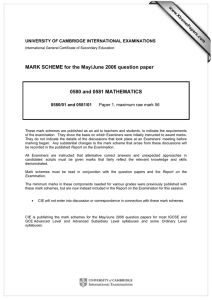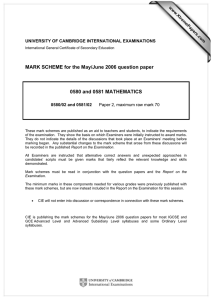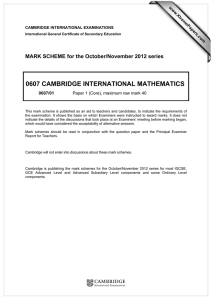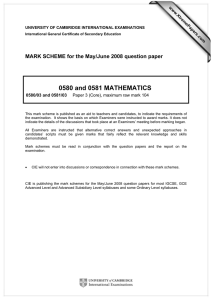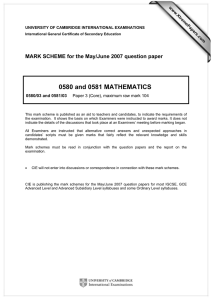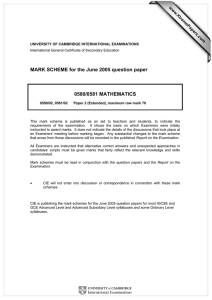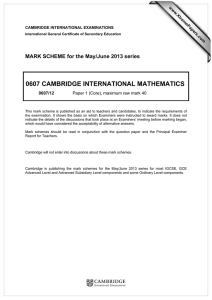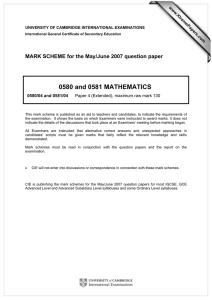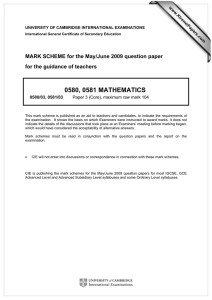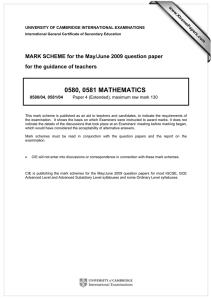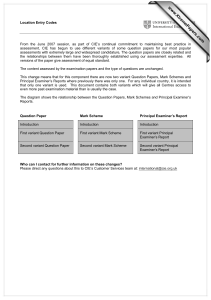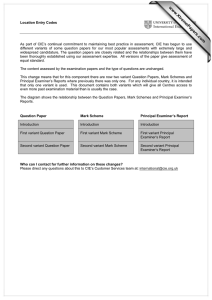MARK SCHEME for the May/June 2006 question paper www.XtremePapers.com
advertisement
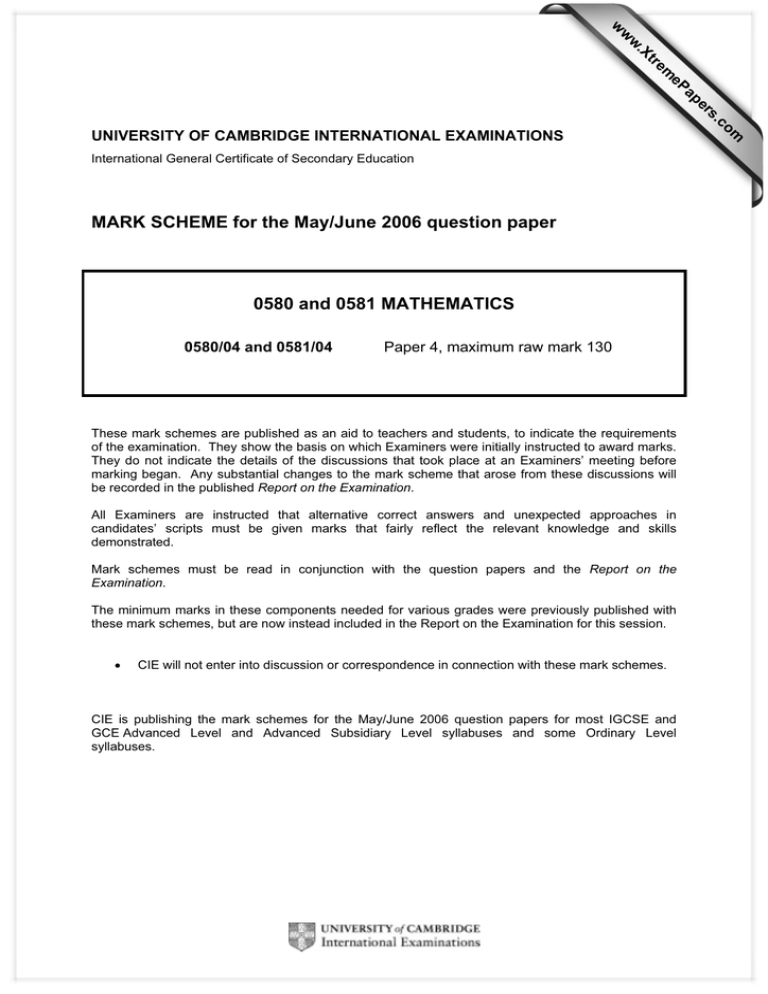
w w ap eP m e tr .X w International General Certificate of Secondary Education MARK SCHEME for the May/June 2006 question paper 0580 and 0581 MATHEMATICS 0580/04 and 0581/04 Paper 4, maximum raw mark 130 These mark schemes are published as an aid to teachers and students, to indicate the requirements of the examination. They show the basis on which Examiners were initially instructed to award marks. They do not indicate the details of the discussions that took place at an Examiners’ meeting before marking began. Any substantial changes to the mark scheme that arose from these discussions will be recorded in the published Report on the Examination. All Examiners are instructed that alternative correct answers and unexpected approaches in candidates’ scripts must be given marks that fairly reflect the relevant knowledge and skills demonstrated. Mark schemes must be read in conjunction with the question papers and the Report on the Examination. The minimum marks in these components needed for various grades were previously published with these mark schemes, but are now instead included in the Report on the Examination for this session. • CIE will not enter into discussion or correspondence in connection with these mark schemes. CIE is publishing the mark schemes for the May/June 2006 question papers for most IGCSE and GCE Advanced Level and Advanced Subsidiary Level syllabuses and some Ordinary Level syllabuses. om .c s er UNIVERSITY OF CAMBRIDGE INTERNATIONAL EXAMINATIONS Page 1 1 (a) (i) Mark Scheme IGCSE – May/June 2006 850 ÷ 80 Must be exact 10 hours 37 mins 30 secs B1 (i) (0)6 08 (a.m.) B1 (ii) 850 M1 10 hrs 48 mins 78.7 (km/hr) (c) (78.7037037) Increasing (more slowly) B1 Accept speed going from 15 to 20. (ii) Decreasing B1 Accept accel. going from 12.5 to 0 (iii) 15 − 5 1 .8 − 1 M1 12.5 (m/s2) A1 20 x 7 or 1 × 3 × 20 2 Second area and addition s.o.i. dep (b) M1 Alt Meth. 20 x 10 or 1 x 3 x 20 2 M1 Sec. area and correct subtraction 170 (m) A1 (v) Areas above and below broken line are approx. equal o.e. B1 (vi) (their 1 7 0 M1 10) x 3.6 ÷ o.e. 61.2 (km/hr) (a) A1 (i) (iv) 2 A1 (ii) ÷ Paper 04 M1 10.625 (hrs) (b) Syllabus 0580 and 0581 Arc length = A1 π × 24 4 (18.8…) M1 Perimeter = 6 + 22 + 18 + 10 + their arc M1 74.8 to 74.9 (cm) A1 Sector area = π × 12 2 4 (113. …) 16 M1 Area = (6 x 22) + (12 x 10) + their sector o.e. 365 to 365.2 (cm2) M1 A1 3 (c) 14600 to 14605 (cm ) B1 (d) their (b) x 2 M1 indep. their (a) x 40 M1 indep. M1 dep. Addition 2 3720 to 3730 (cm ) A1 © University of Cambridge International Examinations 2006 11 Page 2 3 (a) (b) Mark Scheme IGCSE – May/June 2006 Syllabus 0580 and 0581 (i) 1 B1 (ii) –1 B1 (iii) 3 1 or 1 or 1.5 2 2 B1 (i) (r =) 0.25 B1 (s =) 1 B1 (t =) 8 B1 Scales correct S1 (ii) Paper 04 These must be seen. No feedback from the graph. x from –2 to 3 y to accommodate their values. (iii) Their 9 points plotted correctly. They must P3 be in correct square and within 1 mm. ft P2 for 7 or 8 points correct. Ft P1 for 5 or 6 points correct. (c) 4 Smooth curve through all 9 points (1 mm) C1 ft provided correct shape maintained. (i) Correct ruled straight line of full length. B2 SC1 for complete freehand line or for short correct ruled line crossing the curve and y-axis. (ii) 1.52 to 1.57 B1 Spoilt if y coordinate also given. (iii) 1 B1 Circle radius 5 cm (± 2 mm) B1 Circle radius 2 cm (± 2 mm) B1 AB is perpendicular to CD (± 1°) B1 Lines parallel to roads at 0.5 cm from them (all 4 pairs) (Within 1 mm) B1 (i) Accurate (± 1°) angle bisector with arcs B2 (ii) T correct (± 1 mm) and labelled T1 Accurate (± 1° and ± 1 mm) B2 (a) (b) (c) (correct for their graph) 15 Ft SC1 if ± 2° and ± 2 mm perpendicular bisector of TB (using their T) (d) P correct (2.9 to 3.1 cm from 0) and labelled B1 Their TP measured with km (±0.1 km) B1 © University of Cambridge International Examinations 2006 11 Page 3 5 (a) Mark Scheme IGCSE – May/June 2006 y∝ (b) (c) 1 k or y = 2 2 x x o.e A1 30 B1 2 o.e. M1 3.46 (3.464101…..) A1 x2 x x = 120 o.e. M1 4.93 (e) Paper 04 M1 k = 4.8 x 52 10x = 120 (d) Syllabus 0580 and 0581 (4.932424…..) A1 Divided by 4 o.e. B2 SC1 for (2x)2y = 120 o.e. seen or a correct calculation using a value of x. e.g. x = 4, y = 7.5 x = 8, y = 1.875 6 (f) Increases by 25% (g) Division by y M1 Square root M1 (AC =) √(82 + 62) M1 (a) (PE =) √(132 – [ (b) (c) 1 their AC]2) 2 M1 12 A1 1 × 6 × 8 × their PE 3 M1 192 (cm3) A1 sin PCA = their PE 13 a.r.t. 67.4° (d) o.e. B2 tan PME = (0.92307...) (i) theirPE 4 (71.6°) dep M1 M1 36.8° to 36.9° A1 3 13 M1 cos PBC = 76.7° 2 13 dep. Cos = their CE their PE Tan = 13 their CE (67.380....) A1 180 – 2 x anglePME (e) M1 SC1 for 1.5625 seen tan MPE = 4 their PE (18.4°) 2 x angleMPE (76.6576…) A1 2 2 (ii) (KC = ) 4 + 6 – 2 x 4 x 6 cos(theirPBC) Square root of correct combination M1 M1 dep on first M1. √40.957... or 6.3998 6.40 (cm) A1 © University of Cambridge International Examinations 2006 15 Page 4 7 (a) Mark Scheme IGCSE – May/June 2006 Paper 04 (i) (5 , 3) B1 (ii) (3, 5) 1+1 ft from (a)(i) (b) 0 1 1 0 B2 SC1 for a correct column (c) M(Q) = (k – 3 , k – 2) seen M1 SC2 if a numerical value of k is TM(Q) = (k – 3 + 3 , k – 2 + 2) seen M1 chosen and full working leads to (k , k) = (k , k) so y = x E1 (k , k) 0 1 1 0 B2 SC1 for determinant = –1 or for “self-inverse” (i) 0 1 − 1 0 B2 SC1 for 3 correct numbers. (ii) Rotation B1 Centre (0 , 0) B1 270° or clockwise 90° B1 (d) (e) 8 Syllabus 0580 and 0581 (a) (i) 2 (x – 40) + (x + 2) + (2x + 4) + x = 62 2 x + 4x–96 = 0 (ii) o.e. M1 o.e. A1 (x + 12)(x – 8) (=0) M1 x = –12 and 8 (iv) 0.5 [(2 x their 8 + 4) + (their 8 –40)] x their 8 176 M1 Accept 0.5[2x + 4 + x2 – 40] x x c.a.o. A1 2 2 2 (2y – 1) = y + (y + 2) 2 2 2 4y – 4y + 1 = y + y + 4y + 4 2 2y – 8y – 3 = 0 (ii) ) B1 2 (i) ( − 4 ± √ 4 2 − 4.1. − 96 2 or better c.a.o. A1 (iii) 8 (b) 15 o.e. M1 o.e. M1 E1 dep No error at any stage. =0 essential M1 p ± √q where p = –(–8) and r = 2 x 2 o.e r and q = (–8)2 – 4.2. – 3 o.e M1 4.35 c.a.o. A1 –0.35 c.a.o. A1 c.a.o. (13.81125) B2 (iii) 13.8 SC1 for y (y + 2) seen 2 © University of Cambridge International Examinations 2006 16 Page 5 9 (a) Mark Scheme IGCSE – May/June 2006 (i) 1 B1 (ii) 3 B1 (iii) 29 + their k + m = 3 .6 10 o.e. (m =) 4 (b) Syllabus 0580 and 0581 Paper 04 M1 A1 (iv) 9 B1 (i) mid-values 10, 25, 32.5, 37.5, 45, 55, 70 seen M1 At least 6 correct s.o.i. (10 x 10) + (10 x 25) + (15 x 32.5) + (28 x 37.5) + (22 x 45) + (7 x 55) + (8 x 70) M1* Dep on first M1 or mid-values ±0.5 Allow 1 more slip. M1 Dep on second M1* [3822.5] Total ÷ 100 38.2 (ii) (38.225) A1 15 14 × 100 99 M1 210 9900 7 330 (c) (i) (ii) o.e. Final Answer A1 A1 p = 20 B1 q = 72 B1 Horizontal scale correct S1 For each block of correct width Implied by correct use. Ignore the vertical scale. For scale error (halved), award Height 3.3 cm H1 Height 12 cm H1 Height 2 cm H1 H1, H1, H1 for correct ft heights. After H0, H0, H0, give SC1 for correct frequency densities written. (0.67, 2.4, 0.4) 18 © University of Cambridge International Examinations 2006
